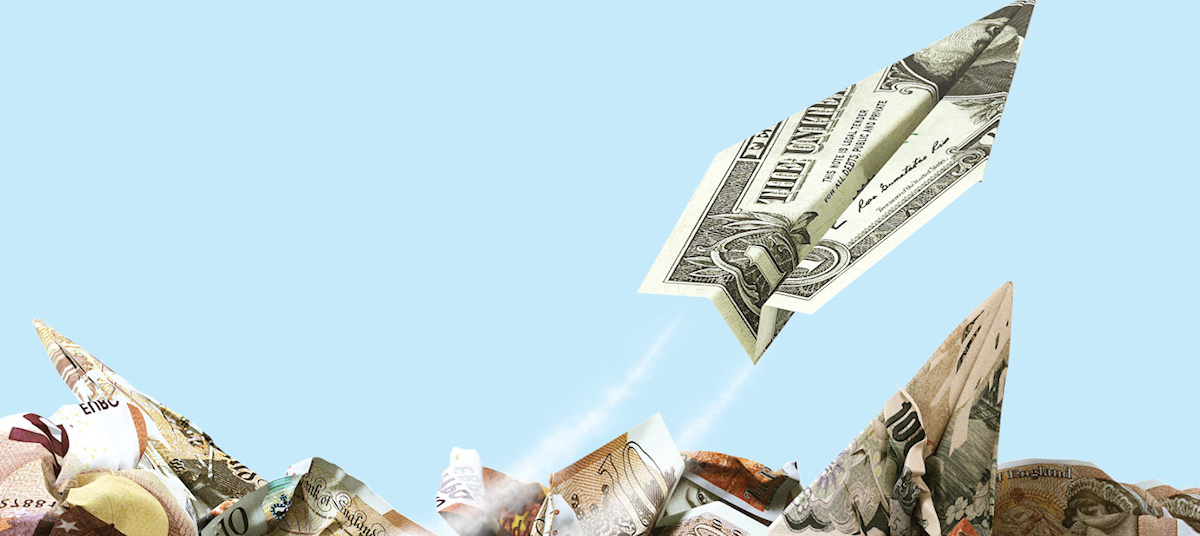
If you’ve followed the market, you’ve watched the U.S. Dollar (USD) gain strength for the last several months. Currencies trade in pairs and relative to one another.
For example, for the USD to be “strong,” a different currency must be “weak.” Right now, the USD is particularly strong against the Japanese Yen and the South Korean Won. If you wanted to take a trip to notoriously expensive Tokyo, a week’s stay at the Tokyo Hilton in July would set you back 37,000 yen a night. Would you believe that is only $234 a night—in downtown Tokyo?! Five years ago, the same room would have cost you $364.
Let’s examine the impact of the strong dollar and what it could mean for your summer travels.
Why is the US Dollar So Strong?
A few factors are giving the USD its value right now. For one thing, U.S. interest rates are higher than most others in the developed world. Why own the Euro, which pays 4% interest, when you can own the dollar, which pays 5% interest?
Not to mention, the U.S. economy is viewed as one of the most robust in the world. Growing economies attract more currency and investments.

What Does This Mean for Americans?
The good news for you, the consumer, is there are great deals available for traveling abroad this summer! Shifts in our economy don’t affect local prices in other countries much, meaning the dollar has more buying power when converted to the local currency.
From Asia to Europe to South America, there are plenty of choices to enjoy your dream vacation. Another popular and affordable Asian destination is Thailand, which features luxury five-star resorts starting around $200 per night. Peru, Argentina, and Colombia offer stunning scenery, intriguing history, and warm hospitality for more affordable rates. Even Australia and Europe are looking more accessible for Americans at the moment, thanks to the lower exchange rates.
So, if you plan to take advantage of this with a bucket list trip this summer, follow these few tips to maximize your travel budget:
- Pre-book travel and entertainment (e.g., hotels, tickets, and tours) while exchange rates are reasonable to avoid uncertainty and fluctuations.
- Opt for a travel credit card that doesn’t have foreign transaction fees, and look for those that offer rewards.
- Pay in local currency with your credit card whenever possible (some point-of-sale systems may give the option).
Additionally, a strong USD makes imports cheaper for Americans to buy—which also means our exports are more expensive to other countries. For example, European luxury car brands like Audi, BMW, and Porsche would see decreases in dollar prices if the value of the manufacturer’s currency drops the USD value.
On the other hand, it makes it difficult for countries that have borrowed money in USD instead of their local currency to pay it back. And as you might expect, it makes it more expensive for international travelers to visit the U.S.
Learn How to Take Advantage of the Strong Dollar
Are you considering that big trip this summer but want to ensure you’re budgeting properly? Or do you have more questions about the USD value’s impact and how to navigate fluctuations? Carlson Investments is happy to talk you through it, guide you in managing your finances effectively, and help you enjoy your money. Speak with one of our advisors today to get started.

Carlson Investments does not provide tax, legal, or accounting advice. This content has been written for informational purposes only. Always consult your individual tax, legal, or financial professionals for advice tailored to your situation.
Let's Talk
Finding a better way doesn’t start with you learning about investment strategy. It starts with us learning about you.
Let’s get started.
Contact Us